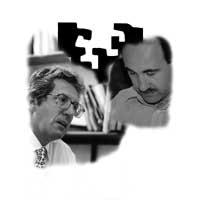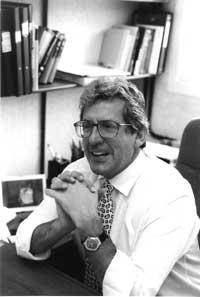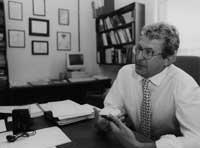Bounties with abundant harvest

Pedro Miguel Etxenike:
Elhuyar: Just handed you the Prince of Asturias Award, starting with congratulation is a human law...
Pedro Miguel Etxenike: Thank you. The truth is that these last days have been very special for me, I have had “very busy”, but I have spent very beautiful moments. For me, besides pleasant, it has been an honor to get this award. In any case, I do not want to record that we remain to rest in the shadow of the prize, since at this moment the prize will be a means in my hands for my people and also as a tool to create new opportunities for young researchers.
Elh. : Therefore, from now on, we hope that within 20 years, or that the list we mentioned at the beginning will be much longer...
P. M. R. I think so, but maybe it's not for what I've done, but for what those who started with me are going to do.
Elh. : Daily work often requires us to look back and try to explain where what we have done so far comes from. What led you to study physics?
P. M. R. I started to study in Lekaroz and there I did the Baccalaureate; the truth is that I liked most things, but I still had a physics and mathematics that I especially liked and I left that way. I could also learn mathematics, but at that time it was more comfortable to do physics, because there was a possibility of doing it in Pamplona and San Sebastian, and that was what put me on the road to physics. So, I don't think there are more reasons for background and weight.

Elh. : We have once heard you that the atmosphere of your house had a great influence on you, which somehow impelled you. How much did it affect you?
P. M. R. We were born in Isaba, my sister Maite, my brother Jabier and I and our parents always showed us that we would not have more of our studies in the world; when we did the first three years of high school we went to Pamplona to do the exams and my mother always helped us prepare things. We also learned at home, the importance of preparing things correctly. It was certainly a great teaching for me.
Elh. : Is what you have learned at home a law that says “Men sana in corpore sana” that you so much like?
P. M. R. It may be so. As I told you, we were born in Isaba and we started walking in the mountains from there from childhood, and it seems that it was the hand of the hobby for sport; then when I went to study in England that hobby increased me and today I also like a lot; skiing, walking in the mountains... before I also practiced squash, and often also I play tennis and ball and golf. My brother and I participated every year in the Behobia-San Sebastian, to see who the longest time ago and to tell the truth, in the last three years I have won.
Elh. : How do you organize to get to all the tasks and hobbies?
P. M. R. I think anyone can do it if they really like what they are doing. You only have to know how to organize well, because if you make the account you will see that we go a long time without doing anything. It is true that these last days I have been longer, but normally I have no problems.
Elh. : She also had other political responsibilities, because she was the Minister of Education of the Basque Government. Was it difficult to return to the world of research?
P. M. R. I spent four years in the Basque Government and little, I think that with more years it would be much more difficult. Four years is nothing about everything essential, in any field, to change and the physics I found when I came back was very similar to what I left when I went. I don't want to say that we got this right away and also then I saw very clear that I had to get out again, what I needed to be able to focus on my work and achieve peace. That is why I went to Cambridge and there I was two and a half years, then in the USA and so little by little I managed to recover my level and learn “craft”.
Elh. : With the tranquility that time gives us, how do you remember the years spent in the Basque Government?
P. M. R. I took command with satisfaction, but also with satisfaction, I think that is the way in politics. At that time, in addition, there was much illusion and I think that in those years great things were done for the self-government of the Basques. The Law of the Basque Country comes to my head, and also the new paths we create for research and new opportunities for young people, through the law of the ikastolas, which was not channeled as I wanted; ETB is also there, although when I see it I did not see it at all.
Elh. : Can a researcher work without putting on a white gown?
P. M. R. Certainly, at least I don't need one to do my job correctly. We create models to then see whether or not those forecasts match when things are measured, so we study the measurements others make and work on the mind, paper and computer.
Elh. : The people who decided to give you the Prince of Asturias Award mentioned their ability to go further in theories and their ability and ability to explain you easily, should this be understood as a losintx in science?
P. M. R. In my case yes. If someone asked me to explain my work in a sentence, I would say that too! Whoever has said that knows what the work of the physicist is and I would say that he also knows my work well, it takes a friend to throw such a tribute!
Elh. : Still missing the Nobel Prize to the list of awards...
P. M. R. Some have mentioned that to me, but it will not be possible. For Euskal Herria to have a Nobel Prize we should have at least 20 or 100 groups like ours. Maybe within 100 years or we will get it.
Elh. : You just said that research is not just “talent”, that behind research there is a lot of work, sweat. Tell us.
P. M. R. Ramón y Cajal said the same thing long before me, that sweat was at least 48% of the research. Many times we think that the most important thing for research is that it is very fast, but normally it is not. It takes patience, will and faith to develop and defend one's ideas. You have to be obsessed by following at any price with what you defend. Of course, that is one of the characteristics of the genius, but also of the madman and, therefore, you have to measure it well.

Elh. : On many occasions you mentioned that knowing what is being done abroad was very important to you...
P. M. R. At the time I studied, it was essential to go abroad for a royal doctorate. Now in Euskal Herria it is not necessary, because the level I found then in Cambridge already exists here, but despite everything it is necessary to leave out. We must not forget that the doctorate is only the beginning of the researcher's research, it is not a summit against what many believe.
Elh. : Ideas, experiences, experience versus others…
P. M. R. Personal relationships are fundamental for conveying ideas, but above all for discussion. We are expanding more and more information through the internet, but this cannot replace the intellectual wealth generated around personal relationships. Obviously, most of our ideas are usually bad, most of the hypotheses we make would end up in the trash if we didn't talk to anyone, but in a debate, little by little, your interlocutor will give you clues that help you see the way and that can't be done online. Nobody can think of extending the theory a little daring through the internet, knowing that there is danger of being ashamed, but always creates a much richer environment.
Elh. : How do you remember the years in Cambridge?
P. M. R. They were very beautiful for me, precisely the most beautiful years of my life. Now I am also very well in Donostia... Many times they tell me that “you could work in any university in the world and why in Donostia?” That really surprises me, because for me it has been a great fortune to be able to do what I want to do where I want to.
Elh. : Are you doing what you want, Peter?
P. M. R. As far as possible yes. I have means, but I would not like it so much, the truth. As I told you at the beginning, the Pinza de Asturias Award that you have given me now is a means to be able to do more things from now on. On that path I have started talking to the Basque Government to create an institute right here; one of the main objectives of this institute is to adapt the appropriate infrastructure to channel in a more easy and comfortable way our relations with foreign researchers, without having to be very concerned with the end of the month bills.
Elh. : He has also known closely the project Museum of Science 21...
P. M. R. It's news that I loved. In today's society, in any democratic society, scientific education is very important because many decisions have technological or scientific contents and, therefore, it is essential to form in it. Disclosure is very important and we must drive all steps in that direction. In this project I have given my name as support to say that I am also a supporter of it. It was especially gratifying for me that Kutxa understood the success of this project.
Elh. : If you had to choose the one you like most about your work, what would you put on top?
P. M. R. It would certainly be very difficult for me. Many times you have an idea and I enjoy it very much; to see that the students advance is also satisfactory or, as I said, to understand that society, in this case Kutxa, needs a project of 2.000 million pesetas so that later the society itself has scientific training.
Buletina
Bidali zure helbide elektronikoa eta jaso asteroko buletina zure sarrera-ontzian











